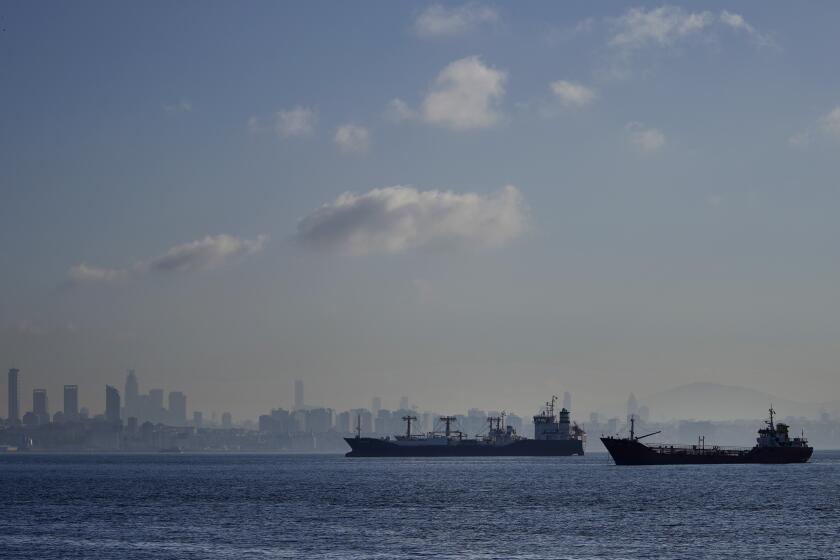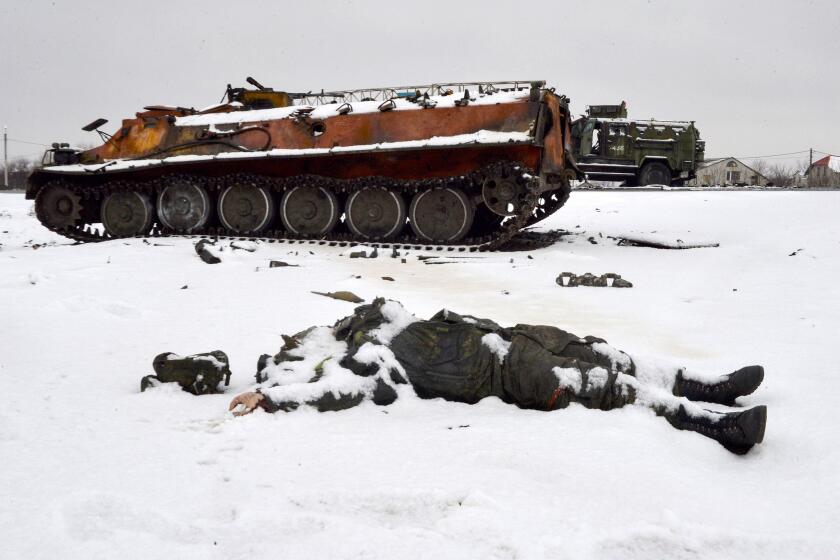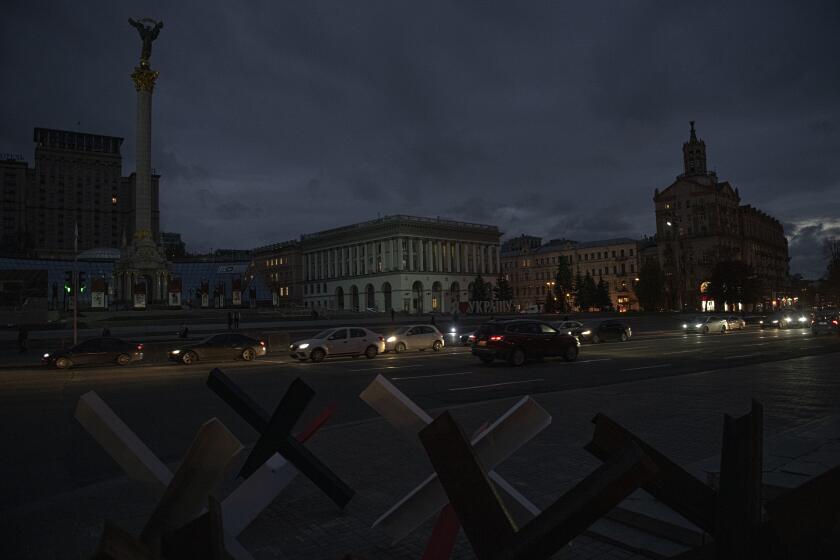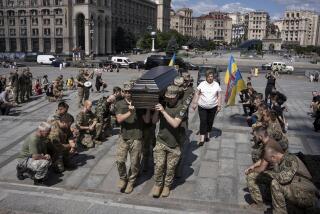Ukrainian nuclear plant loses grid power again amid Russian shelling
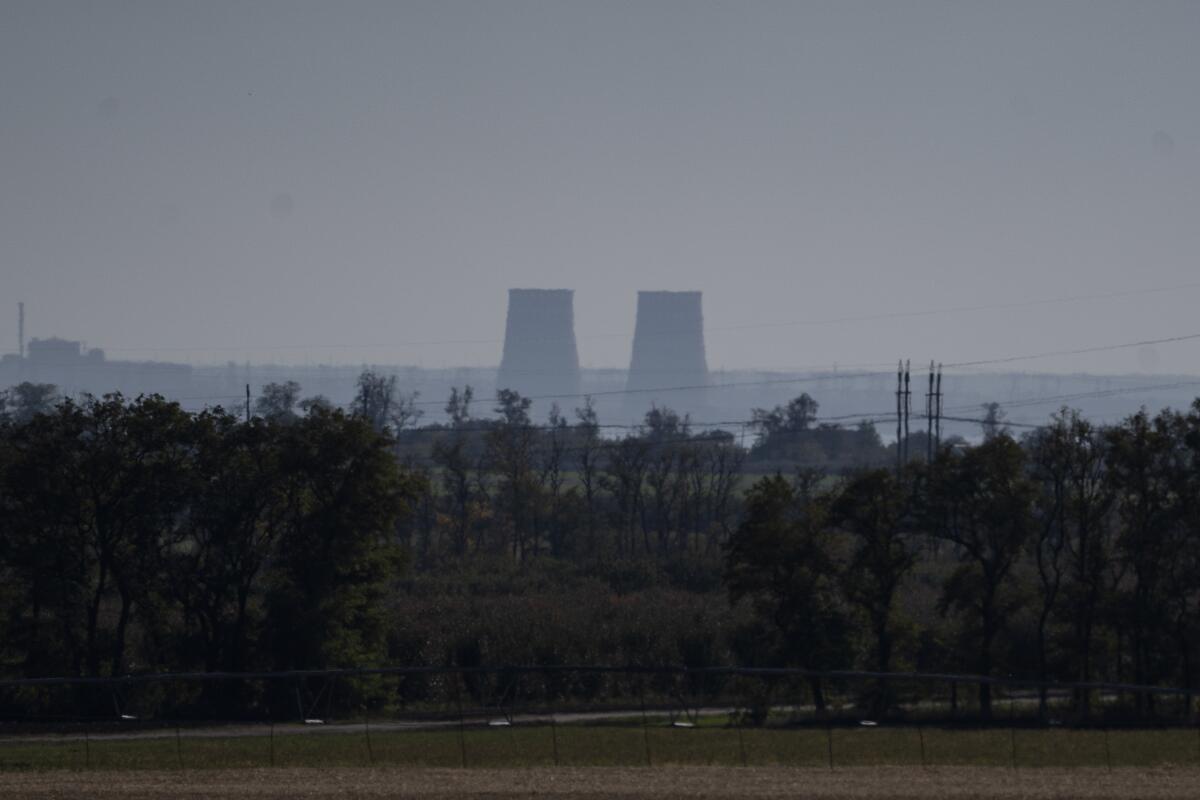
- Share via
KYIV, Ukraine — Ukraine’s nuclear state operator said Thursday that Russia has shelled and damaged power lines connecting Europe’s largest nuclear power plant to the Ukrainian grid, leaving the plant reliant on diesel generators again.
The generators have enough fuel to maintain the Zaporizhzhia facility in southeastern Ukraine for just 15 days, Energoatom, the state enterprise that runs the plant, said in a post on its Telegram channel.
“The countdown has begun,” Energoatom said, noting that it had limited possibilities to “maintain the ZNPP in a safe mode,” raising fears of a potential nuclear disaster.
As power lines and substations have been damaged in fighting, the plant has repeatedly been forced to rely on diesel generators until the power supply can be restored.
The International Atomic Energy Agency said Thursday that the switch to backup power from generators again further underlines “the extremely precarious nuclear safety and security situation at the facility and the urgent need to establish a protection zone around it.”
The development “again demonstrates the plant’s fragile and vulnerable situation,” IAEA Director-General Rafael Grossi said, adding that relying on generator power ”is clearly not a sustainable way to operate a major nuclear facility. Measures are needed to prevent a nuclear accident at the site. The establishment of a nuclear safety and security protection zone is urgently needed.”
Ukrainian mayors, civilian administrators and nuclear power plant workers say they have been abducted, threatened or beaten by Russian forces.
With its six reactors inoperative, the plant relies on outside electricity to cool its spent fuel. Russia and Ukraine have traded blame for months amid the war for shelling at and around the plant, which the IAEA has warned could cause a radiation emergency.
Russia gave a different account, blaming Ukraine. The Russian state-run news agency Tass quoted an official at Russia’s nuclear power operator, Rosenergoatom, as saying that Ukraine had switched off two power lines providing the nuclear plant with electricity.
The official, Renat Karchaa, said the move deprived the city of Energodar, where the plant’s workers live, of heating. He confirmed that emergency backup diesel generators had to be switched on to cool the reactors and run other safety systems but denied that the problems had been caused by Russian shelling of power lines.
Russian forces occupied the plant during the early days of the war. The plant sits in the Zaporizhzhia region, part of which has been occupied by Russian forces and illegally annexed, along with three other provinces, by Russian President Vladimir Putin last month.
Moscow had suspended its participation in an agreement that allowed the shipment of millions of tons of Ukrainian grain through the Black Sea.
Although Putin signed a decree transferring the plant to Russian ownership, Ukrainian workers continue to run the plant. Energoatom has repeatedly called for the withdrawal of Russian forces from the plant and the creation of a demilitarized zone around it.
Energoatom said Russia shelled two power lines that were connecting the plant to the Ukrainian grid overnight and accused it of being “an attempt to reconnect the nuclear plant to the Russian power system.”
Across the Dnieper River from the power plant, the city of Nikopol was also shelled, damaging residential buildings, a gas station and several private enterprises, Ukrainian President Volodymyr Zelensky’s office said Thursday.
Other Ukrainian cities were also hit, with Russia using drones, missiles and heavy artillery in attacks that left six civilians dead and 16 others wounded, according to the president’s office. Energy and water infrastructure facilities were hit in Zelensky’s native city of Kryvyi Rih, leaving several districts without electricity or water in the city, which had a prewar population of 635,000 people, local Gov. Oleksandr Vilkul said.
Two Siberian journalists reporting on the war in Ukraine say they won’t be muzzled. ‘This is what we are supposed to do.’
Farther east in the Donetsk region, battles continued for the towns of Bakhmut and Avdiivka, where authorities said the population was living without electricity or heat and were under constant shelling. Over the last day, six cities and villages in the region were attacked by heavy artillery, while in the northeast, Ukraine’s second-largest city, Kharkiv, was hit by three missiles, officials said.
Separately, seven ships carrying 290,000 tons of agricultural products set sail from Ukrainian seaports heading to Asia and Europe, a day after Russia agreed to rejoin a wartime agreement allowing Ukrainian grain and other commodities to be shipped to world markets.
In announcing that Russia was rejoining the pact, Putin said Moscow had received assurances that Ukraine wouldn’t use the humanitarian corridors to attack Russian forces. He warned that Russia reserved the right to withdraw again if Kyiv breaks its word.
Kremlin spokesman Dmitry Peskov cautioned Thursday that Russia’s decision to rejoin doesn’t mean that the deal will be extended after Nov. 19.
Rolling blackouts are increasing across Ukraine as the government rushes to stabilize the energy grid and repair systems damaged by Russian attacks.
Russia had suspended its participation in the grain deal over the weekend, citing an alleged drone attack against its Black Sea fleet in Crimea. Ukraine didn’t claim responsibility for an attack, and Zelensky said Wednesday that Moscow’s return to the agreement showed that “Russian blackmail did not lead to anything.”
Ukrainian Foreign Minister Dmytro Kuleba told Spanish radio station Cadena SER that Ukraine has never used the grain corridor for military purposes, claiming that “people of goodwill” were behind the attack in the Black Sea.
In Moscow, the Russian Foreign Ministry summoned British Ambassador Deborah Bronnert on Thursday, saying she was called in connection with the alleged participation of British instructors in the Saturday attack on Black Sea fleet facilities in Sevastopol in Crimea. Bronnert made no comment upon leaving the ministry after a meeting that lasted about a half hour.
Russian Foreign Minister Sergei Lavrov said Thursday that he hadn’t seen progress regarding the export of Russian fertilizers and grain, despite the reimplementation of the Ukrainian part of the United Nations-sponsored grain deal.
Start your day right
Sign up for Essential California for the L.A. Times biggest news, features and recommendations in your inbox six days a week.
You may occasionally receive promotional content from the Los Angeles Times.
Speaking to reporters at a joint news conference with his Jordanian counterpart Ayman Safadi, Lavrov also said Russia was pleased that the Ukrainian leadership had signed guarantees “that no attempts would be made to use humanitarian routes in the Black Sea for military purposes.”
Ukrainian Foreign Ministry spokesman Oleh Nikolenko denied that Kyiv had made such commitments.
“Ukraine did not use and did not plan to use the grain corridor for military purposes. The Ukrainian side clearly adheres to the provisions of the grain agreement,” Nikolenko wrote on Facebook. “Our state did not take on any new obligations.”
The ships that set sail Thursday included one carrying 29,000 tons of sunflower seeds bound for Oman, and one carrying 67,000 tons of corn heading to China, according to the Ukrainian Ministry of Infrastructure.
Since the deal was reached over the summer, 430 ships have exported 10 million tons of Ukrainian agricultural products to countries in Africa, Asia and Europe. The infrastructure ministry said that export volumes in October “could have been 30-40% higher if Russia had not artificially blocked inspections in the Bosphorus.”
Meanwhile, Kremlin-backed authorities in the Donetsk region and Zelensky’s office announced another prisoner exchange Thursday, this one involving 107 military personnel on each side.
More to Read
Sign up for Essential California
The most important California stories and recommendations in your inbox every morning.
You may occasionally receive promotional content from the Los Angeles Times.

